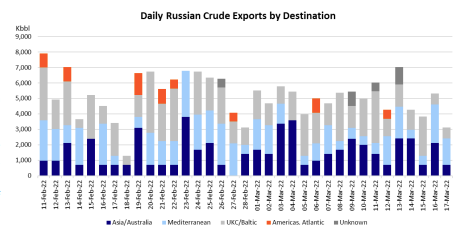Nothing To See Here (Yet)
When will Russian exports really stop flowing?
Russia invaded Ukraine on 24 February 2022. In the 22 days that followed, most of the world has responded with a vast array of economic sanctions. Initially, most of these sanctions carefully avoided targeting the energy industry, because Russia is a major oil and gas supplier, in particular to Europe. However, even though Western companies could still legally purchase Russian oil, many decided that they would no longer do business with Moscow. The oil companies that are “self-sanctioning” include most European refiners, including oil majors such as BP, Shell and TotalEnergies.
Despite a lack of official sanctions, potential importers of Russian oil have to deal with significant transaction challenges, including problems financing, insuring and shipping the product. On top of that, firms that continue to transact with Russia face major reputational risks. Over time, the pressure grew to officially sanction Russian energy exports and on March 8, U.S. President Biden signed an Executive Order to ban the import of Russian oil, LNG, and coal to the United States. Canada, Australia, and the U.K. also restricted oil imports from Russia. How much of an impact will these actions have on Russian exports, when will this be visible in the physical market, and what could be the impact on the tanker market?
Please fill out the form to read article.

